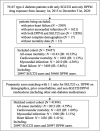Incident heart failure and myocardial infarction in sodium-glucose cotransporter-2 vs. dipeptidyl peptidase-4 inhibitor users
- PMID: 35132823
- PMCID: PMC8934922
- DOI: 10.1002/ehf2.13830
Incident heart failure and myocardial infarction in sodium-glucose cotransporter-2 vs. dipeptidyl peptidase-4 inhibitor users
Abstract
Aims: This study aimed to compare the rates of major cardiovascular adverse events in sodium-glucose cotransporter-2 inhibitors (SGLT2I) and dipeptidyl peptidase-4 inhibitors (DPP4I) users in a Chinese population. SGLT2I and DPP4I are increasingly prescribed for type 2 diabetes mellitus patients. However, few population-based studies are comparing their effects on incident heart failure or myocardial infarction.
Methods and results: This was a population-based retrospective cohort study using the electronic health record database in Hong Kong, including type 2 diabetes mellitus patients receiving either SGLT2I or DPP4I from 1 January 2015 to 31 December 2020. Propensity score matching was performed in a 1:1 ratio based on demographics, past comorbidities, and non-SGLT2I/DPP4I medications with nearest neighbour matching (caliper = 0.1). Univariable and multivariable Cox models were used to identify significant predictors for new-onset heart failure, new-onset myocardial infarction, cardiovascular mortality, and all-cause mortality. Sensitivity analyses with competing risk models and multiple propensity score matching approaches were conducted. A total of 41 994 patients (58.89% males, median admission age at 58 years old, interquartile range [IQR]: 51.2-65.3) were included with a median follow-up of 5.6 years (IQR: 5.32-5.82). In the matched cohort, SGLT2I use was significantly associated with lower risks of new-onset heart failure (hazard ratio [HR]: 0.73, 95% confidence interval [CI]: [0.66, 0.81], P < 0.0001), myocardial infarction (HR: 0.81, 95% CI: [0.73, 0.90], P < 0.0001), cardiovascular mortality (HR: 0.67, 95% CI: [0.53, 0.84], P < 0.001), and all-cause mortality (HR: 0.26, 95% CI: [0.24, 0.29], P < 0.0001) after adjusting for significant demographics, past comorbidities, and non-SGLT2I/DPP4I medications.
Conclusions: SGLT2 inhibitors are protective against adverse cardiovascular events including new-onset heart failure, myocardial infarction, cardiovascular mortality, and all-cause mortality. The prescription of SGLT2I is preferred when taken into consideration individual cardiovascular and metabolic risk profiles in addition to drug-drug interactions.
Keywords: Diabetes mellitus; Heart failure; Myocardial infarction; Sodium-glucose co-transporter.
© 2022 The Authors. ESC Heart Failure published by John Wiley & Sons Ltd on behalf of the European Society of Cardiology.
Conflict of interest statement
None declared.
Figures


Similar articles
-
Comparing sodium-glucose cotransporter 2 inhibitors and dipeptidyl peptidase-4 inhibitors on new-onset depression: a propensity score-matched study in Hong Kong.Acta Diabetol. 2023 Jul;60(7):917-927. doi: 10.1007/s00592-023-02063-6. Epub 2023 Mar 31. Acta Diabetol. 2023. PMID: 37000300 Free PMC article.
-
Comparison of Sodium-Glucose Cotransporter-2 Inhibitor and Dipeptidyl Peptidase-4 Inhibitor on the Risks of New-Onset Atrial Fibrillation, Stroke and Mortality in Diabetic Patients: A Propensity Score-Matched Study in Hong Kong.Cardiovasc Drugs Ther. 2023 Jun;37(3):561-569. doi: 10.1007/s10557-022-07319-x. Epub 2022 Feb 10. Cardiovasc Drugs Ther. 2023. PMID: 35142921 Free PMC article.
-
New-onset syncope in diabetic patients treated with sodium-glucose cotransporter-2 inhibitors versus dipeptidyl peptidase-4 inhibitors: a Chinese population-based cohort study.Eur Heart J Cardiovasc Pharmacother. 2024 Feb 23;10(2):103-117. doi: 10.1093/ehjcvp/pvad086. Eur Heart J Cardiovasc Pharmacother. 2024. PMID: 37962962
-
Effects of new hypoglycemic drugs on patients with heart failure: a systematic review and network meta-analysis.Postgrad Med J. 2025 Mar 16;101(1194):330-350. doi: 10.1093/postmj/qgae148. Postgrad Med J. 2025. PMID: 39487697
-
Association of Sodium-Glucose Cotransporter-2 Inhibitors vs Dipeptidyl Peptidase-4 Inhibitors With Pneumonia, COVID-19, and Other Adverse Respiratory Events in Patients With Type 2 Diabetes Mellitus: A Systematic Review and Meta-analysis.Can J Diabetes. 2024 Aug;48(6):364-372.e1. doi: 10.1016/j.jcjd.2024.04.009. Epub 2024 Apr 16. Can J Diabetes. 2024. PMID: 38636589
Cited by
-
Comparing sodium-glucose cotransporter 2 inhibitors and dipeptidyl peptidase-4 inhibitors on new-onset depression: a propensity score-matched study in Hong Kong.Acta Diabetol. 2023 Jul;60(7):917-927. doi: 10.1007/s00592-023-02063-6. Epub 2023 Mar 31. Acta Diabetol. 2023. PMID: 37000300 Free PMC article.
-
Numbers Needed to Treat for Preventing Adverse Cardiovascular Outcomes for Sodium-Glucose Cotransporter 2 Inhibitors vs. Dipeptidyl Peptidase 4 Inhibitors: The Hong Kong Diabetes Study.Cardiovasc Drugs Ther. 2024 Apr;38(2):391-392. doi: 10.1007/s10557-024-07550-8. Epub 2024 Jan 20. Cardiovasc Drugs Ther. 2024. PMID: 38244149 No abstract available.
-
Incident heart failure, arrhythmias and cardiovascular outcomes with sodium-glucose cotransporter 2 (SGLT2) inhibitor use in patients with diabetes: Insights from a global federated electronic medical record database.Diabetes Obes Metab. 2023 Feb;25(2):602-610. doi: 10.1111/dom.14854. Epub 2022 Sep 27. Diabetes Obes Metab. 2023. PMID: 36054168 Free PMC article.
References
-
- Zheng Y, Ley SH, Hu FB. Global aetiology and epidemiology of type 2 diabetes mellitus and its complications. Nat Rev Endocrinol 2018; 14: 88–98. - PubMed
-
- Cho YK, Kang YM, Lee SE, Lee J, Park JY, Lee WJ, Park JY, Lee WJ, Kim YJ, Jung CH. Efficacy and safety of combination therapy with SGLT2 and DPP4 inhibitors in the treatment of type 2 diabetes: a systematic review and meta‐analysis. Diabetes Metab 2018; 44: 393–401. - PubMed
-
- Zinman B, Wanner C, Lachin JM, Fitchett D, Bluhmki E, Hantel S, Mattheus M, Devins T, Johansen OE, Woerle HJ, Broedl UC, Inzucchi SE, EMPA‐REG OUTCOME Investigators . Empagliflozin, cardiovascular outcomes, and mortality in type 2 diabetes. N Engl J Med 2015; 373: 2117–2128. - PubMed
MeSH terms
Substances
LinkOut - more resources
Full Text Sources
Medical
Miscellaneous

